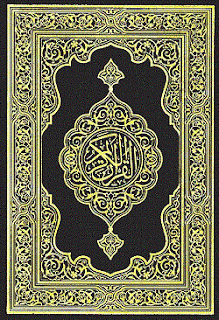 It takes a certain kind of true arrogance for a non-Muslim to hold forth in public on the Quran while sure in the knowledge that his understanding of this highly important religious document is paltry.
It takes a certain kind of true arrogance for a non-Muslim to hold forth in public on the Quran while sure in the knowledge that his understanding of this highly important religious document is paltry.Nonetheless, I am willing to share my initial impressions. It is not as if I have not read the Quran, and some commentary on the Quran, in previous years, but this year I am taking a bit more of a methodical approach and hope to expand my understanding of the Muslim book in, at least, some modest measure.
It is believed among the believers that the Quran was written by Allah in Paradise before there was anything else. The Quran was composed by Allah in Arabic because Arabic is, in fact, the very language of Allah. Arabic is, thereby, considered a language holy above all others.
In this way, it is believed by the devout that the original religion of mankind is Islam. Islam is the First Religion. Islam is the source of both Judaism and Christianity, which corrupted the Original Word of Allah.
Thus, Adam and Eve were Muslims.
Moses was a Muslim.
Abraham, Isaac, and Jacob were all Muslims.
Many Palestinian-Arabs, of course, would have you believe that Jesus was the "First Palestinian Shaheed" and, therefore, a Muslim.
And so forth.
{This, by the way, remains puzzling to most westerners who cannot quite wrap their brains around the idea that, despite the fact that Muhammad was not born until the latter part of the sixth-century, Islam could nonetheless somehow antecede both Judaism and Christianity.}
The function of the Prophet Muhammad was to restore the original faith via transmitting the Quran as received via the Angel Gabriel in the early seventh-century, which is why he must be the Final Prophet. Allah sent down bits and pieces of the Quran over the course of many years until the document was a complete and precise copy of the original. The truly devout insist that the Arabic version of the Quran as we receive it today is precisely the same Quran as offered to the world by Muhammad and offered to Muhammad by Allah via Gabriel.
The next thing to note about this very interesting religious document is its lack of narrative. The Bible is a book of stories and, needless to say, the New Testament documents the story of Jesus Christ, but the Quran holds little coherent narrative structure, which is part of the reason that it so inaccessible to those of us who did not grow up with it.
Before I get into an exposition of the actual text, however, I need to address three likely criticisms from the get-go. The first is that the Quran can only really be understood in the original Arabic and therefore any interpretations of the document derived from translations must, by necessity, be distortions. This is, of course, not an entirely unreasonable objection because, indeed, any non-Arabic reader who approaches the Quran in say, Tagalog, will undoubtedly come away with a somewhat different sense of the book then would an Arab from Karachi.
This is inevitable, however its significance only goes so far. One may get a different feel for the broad resonances of the Quran in translation, but this does not mean that the translators are incapable of accurately portraying sentences and paragraphs in other tongues. The objection is often raised when non-Muslim critics - such as, say, Robert Spencer - point out some of the more violent passages in the book. When I begin my actual criticisms of the text in forthcoming segments I will point out specifics.
The second objection that is generally raised when non-Muslim critics of the Quran point to some of the more violently objectionable passages is that the material was taken out of context, often with the implication that it was done so in a largely malicious manner. I have no doubt that in many cases this is true. However, it should also be noted that the book is pretty thin on context to begin with. Because there is so little coherent narrative structure there is, by definition, very little context. Also, of course, there are certain passages wherein the meaning is quite clear, context or no context. I will point out specifics of this, too, in future segments of this series.
Finally, it is often noted that the Hebraic Bible is at least as violent as the Quran, if not considerably more so. This also is true. Yahveh, much like Allah, is a hawk-nosed, dark-eyed, swarthy desert diety with a long black beard and a mean disposition. The difference is that the Hebraic Bible is descriptive in its violence, whereas the Quran is prescriptive in its violence.
The Bible says, "This happened."
The Quran says, "Do this."
And that makes all the difference in the world.
{Fair disclosure: I am significantly influenced by Robert Spencer in my understanding of this material. I recognize, of course, that for many people this is sufficient reason to disregard anything further that I might say on the matter. To such people all I can say is that if you wish to be fair then you need to give the man a fair hearing. He has video discussions all over youtube on the topics of Islam and the Quran and he very clearly knows what he is talking about. The man can recite Sura and Hadith directly off the top of his head... He's also pretty funny, by the way.}
